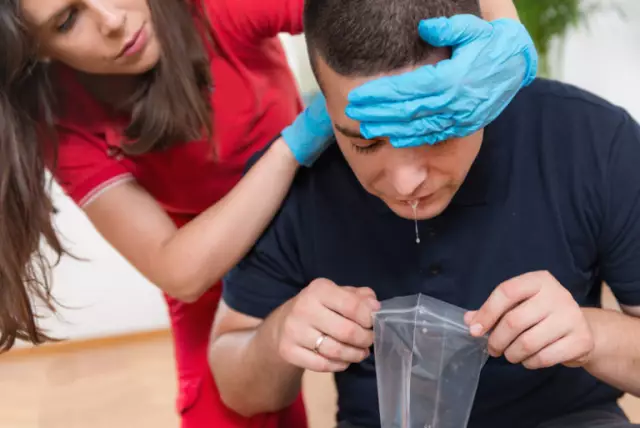- Author Rachel Wainwright [email protected].
- Public 2023-12-15 07:39.
- Last modified 2025-11-02 20:14.
Poisoning coffee
Millions of people start their morning with a cup of aromatic coffee. It helps to wake up, tones up, improves mood. However, with constant use, over time, a person develops an addiction, and one cup of coffee is no longer enough to get an invigorating effect. As a result, coffee lovers increase their consumption of this drink, which has a significant effect on the body, up to and including poisoning.

Source: depositphotos.com
How does coffee poisoning happen?
The tonic effect of coffee is associated with its high caffeine content. This substance has the ability to block the sensitivity of nerve receptors to adenosine, resulting in a feeling of vigor and energy.
In addition, caffeine stimulates the synthesis of adrenaline, a hormone that causes an increase in heart rate, improved blood supply to muscles and an increase in the speed of metabolic processes.
The main reason for the formation of theism (dependence on coffee) is the ability of caffeine to increase the secretion of one of the hormones of joy - dopamine. It is dopamine that provides a person with a good mood after a cup of coffee, and causes a feeling of pleasure.
Thus, caffeine has a significant effect on the nervous system, and an excess of this substance can lead to serious distress.
The toxic dose of caffeine is different for each person. Some people may experience symptoms of coffee poisoning after two or three cups of this drink, while others may drink much more and not feel discomfort. But for most adults, consuming more than 0.5 grams of caffeine per day is toxic and leads to health problems. This dose of caffeine is found in about 6 cups of coffee.
The lethal dose of caffeine is 10 g.
Poisoning symptoms
The characteristic signs of coffee poisoning usually appear within half an hour after taking too much of a tonic drink. These include:
- redness of the face;
- pronounced shine of the eyes;
- feeling hot;
- trembling in the limbs or throughout the body;
- tachycardia;
- dizziness;
- nausea;
- increased sweating;
- increased urination;
- abdominal pain of a spastic nature;
- diarrhea;
- nervousness and increased irritability;
- insomnia.
With severe coffee poisoning, hallucinations may appear, which is associated with excessive stimulation of some brain structures with caffeine and a sharp inhibition of others. A very dangerous symptom in coffee poisoning is cyanosis (blue skin), its appearance indicates a serious dysfunction of the cardiovascular system.

Source: depositphotos.com
First aid for poisoning
In order to stop the symptoms of poisoning as soon as possible, the following measures are necessary:
- Gastric lavage. This removes the caffeine that has not been absorbed in time. The patient is given a few glasses of water to drink and then vomiting.
- To neutralize caffeine that has already entered the small intestine, the patient should take activated charcoal at the rate of 1 tablet for every 10 kg of body weight.
- Provide plenty of fluids. The intake of a large amount of fluid helps to increase urine output, and together with urine, excess caffeine is removed from the body. With severe diarrhea, the patient is given a solution of Regidron to drink - 1 liter should be drunk in small portions.
- Eat a banana. This will reduce muscle tremors and feelings of nervous tension, since banana contains a large amount of potassium, which improves the conduction of neuromuscular impulses.
- Provide fresh air to reduce dizziness and nausea.
When is medical attention required?
If the first aid measures taken do not lead to relief of symptoms of coffee poisoning, you should immediately consult a doctor. In case of severe poisoning, when the patient has cyanosis, convulsions, hallucinations or other disturbances of consciousness, an ambulance should be called immediately or taken to the hospital on his own.
Medical care consists primarily in forcing diuresis in order to remove caffeine from the body. In addition, symptomatic therapy of existing disorders of the nervous, cardiovascular, digestive and muscular systems is carried out.
In case of severe coffee poisoning, it may be necessary to carry out hemosorption on a column with a carbon sorbent.
Possible consequences
In most cases, coffee poisoning is easy, and after first aid, the patient immediately gets better. But with too much coffee drunk in a short time, poisoning can be accompanied by serious complications:
- heart rhythm disturbances;
- epileptic seizures.
Prevention
Prevention of coffee poisoning is very simple: you must remember that you should not drink more than three cups of coffee during the day.
Children should not be given coffee because they are sensitive to caffeine and a single cup of coffee can cause poisoning.
If you experience even a slight discomfort associated with drinking coffee, you must immediately stop drinking it further, eat a banana and drink a few glasses of water. Usually, these measures are sufficient to prevent poisoning.
YouTube video related to the article:

Elena Minkina Doctor anesthesiologist-resuscitator About the author
Education: graduated from the Tashkent State Medical Institute, specializing in general medicine in 1991. Repeatedly passed refresher courses.
Work experience: anesthesiologist-resuscitator of the city maternity complex, resuscitator of the hemodialysis department.
The information is generalized and provided for informational purposes only. At the first sign of illness, see your doctor. Self-medication is hazardous to health!






